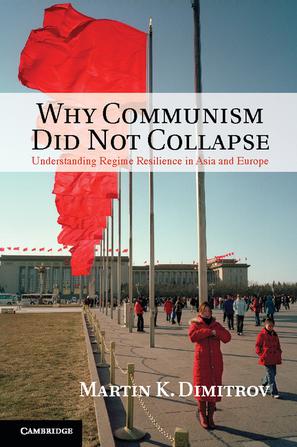
章节目录
Table of Contents Part I. Reform and Resilience: 1. Understanding communist collapse and resilience Martin K. Dimitrov 2. Resilience and collapse in China and the Soviet Union Thomas Bernstein Part II. Ideology and Resilience: 3. Ideological erosion and the breakdown of communist regimes Vladimir Tismaneanu 4. Ideological introversion and regime survival: North Korea's 'our-style socialism' Charles Armstrong Part III. Contagion and Resilience: 5. Bringing down dictators: waves of democratic change in communist and postcommunist Europe and Eurasia Valerie J. Bunce and Sharon L. Wolchik 6. The dynamics of contagion in the Soviet Bloc and the impact on regime survival Mark Kramer Part IV. Inclusion and Resilience: 7. Authoritarian survival, resilience, and the selectorate theory Mary Gallagher and Jonathan Hanson 8. Cause or consequence? Private-sector development and communist resilience in China Kellee S. Tsai Part V. Accountability and Resilience: 9. Vietnam through Chinese eyes: divergent accountability in single-party regimes Regina Abrami, Edmund Malesky and Yu Zheng 10. Vertical accountability in communist regimes: the role of citizen complaints in Bulgaria and China Martin K. Dimitrov 11. Conclusion: whither communist regime resilience Martin K. Dimitrov.
内容简介
This volume brings together a distinguished group of scholars working to address the puzzling durability of communist autocracies in Eastern Europe and Asia, which are the longest-lasting type of nondemocratic regime to emerge after World War I. The volume conceptualizes the communist universe as consisting of the ten regimes in Eastern Europe and Mongolia that eventually collapsed in 1989–91, and the five regimes that survived the fall of the Berlin Wall: China, Vietnam, Laos, North Korea, and Cuba. Taken together, the essays offer a theoretical argument that emphasizes the importance of institutional adaptations as a foundation of communist resilience. In particular, the contributors focus on four adaptations: of the economy, of ideology, of the mechanisms for inclusion of potential rivals, and of the institutions of vertical and horizontal accountability. The volume argues that when regimes are no longer able to implement adaptive change, contingent leadership choices and contagion dynamics make collapse more likely. By conducting systematic paired comparisons of the European and Asian cases and by developing arguments that encompass both collapse and resilience, the volume offers a new methodological approach for studying communist autocracies. Offers a new theoretical explanation of the resilience of communist autocracies that emphasizes the structural conditions under which these regimes are able to implement adaptive change Offers a new methodological approach for studying communist autocracies by conducting paired comparisons between the ten regimes that eventually collapsed in 1989�91 and the five regimes that survived past 1989: China, Vietnam, Laos, North Korea, and Cuba Makes a major empirical contribution to our knowledge of how communist autocracies function by: 1) adopting a global perspective onto the phenomenon of global communism; 2) analyzing unfamiliar adaptations, such as the development of institutions of accountability; and 3) using new evidence to challenge existing interpretations of communist durability (especially for countries like China, Vietnam, and North Korea) and of the eventual collapse of communist regimes in Eastern Europe and in Mongolia
下载说明
1、Why Communism Did Not Collapse是作者Martin K. Dimitrov (创作的原创作品,下载链接均为网友上传的网盘链接!
2、相识电子书提供优质免费的txt、pdf等下载链接,所有电子书均为完整版!
下载链接
热门推荐
- 1 独腿旅行者
- 2 人间正道
- 3 野兽必死
- 4 森林中有许多酒
- 5 鲁迅传
- 6 动物园长夫人
- 7 不再努力成为另一个人
- 8 热爱生活的一万个理由
- 9 专家的窘境
- 10 艺术的旅程
